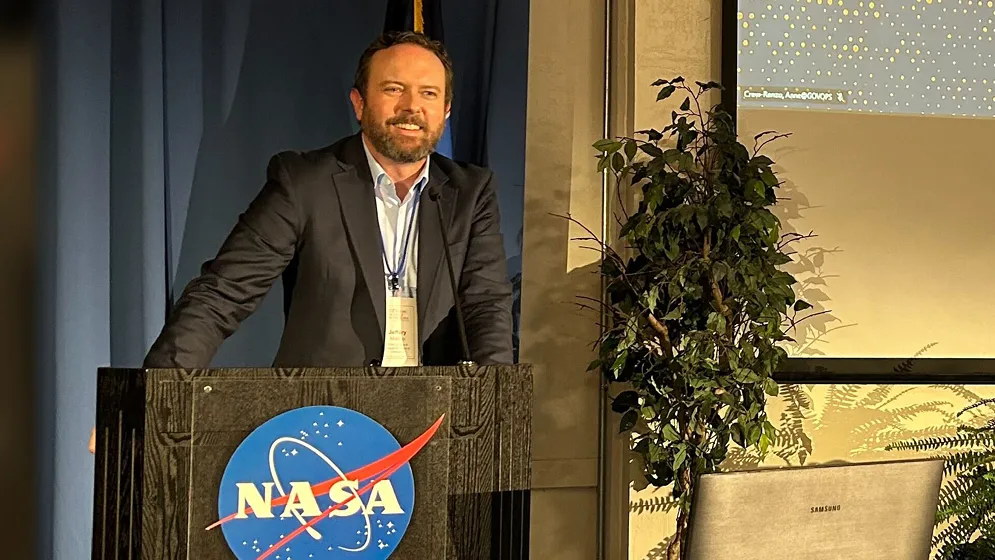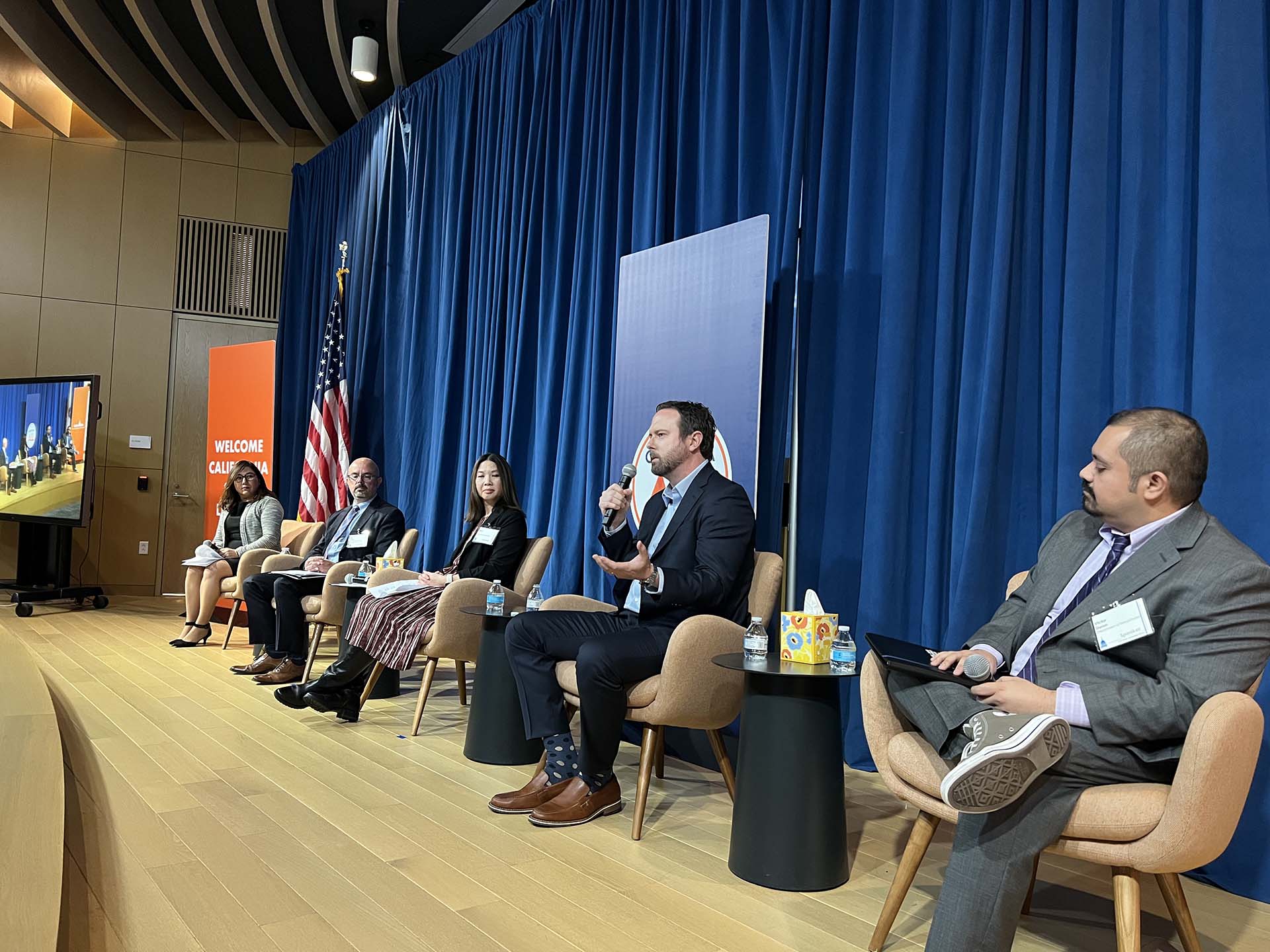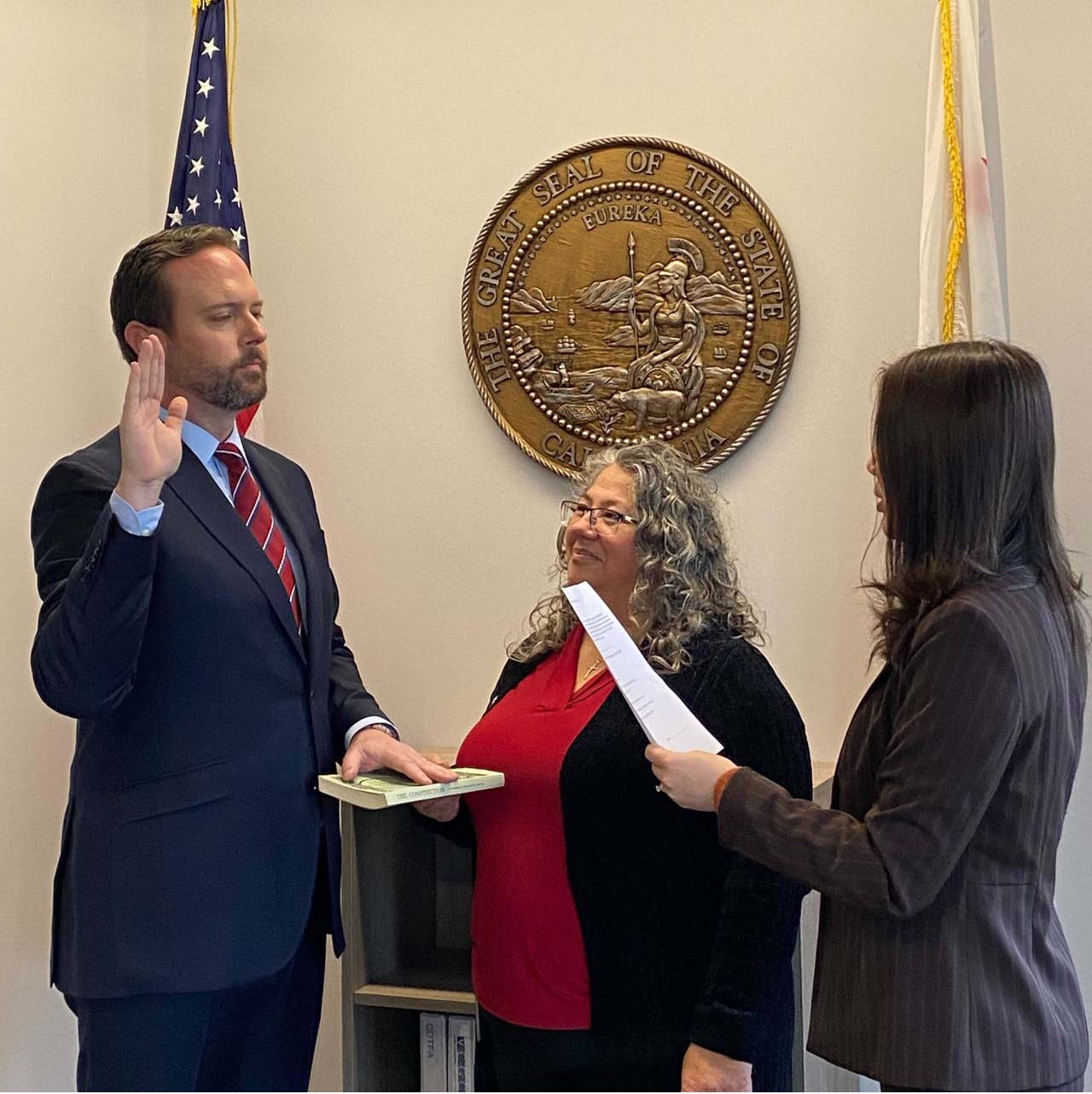Alan Llavore | Office of Strategic Communication | (909) 537-5007 | allavore@csusb.edu

Cal State San Bernardino alumnus Jeffery Marino (2004, English) was recently appointed director of the Office of Data and Innovation (ODI), an office created in Gov. Gavin Newsom’s first budget in 2019. As its website states, ODI “helps departments meet Californians where they are. We use data, human-centered design and technology to create services that are easier for everyone to use.”
But how did a first-generation college student who had dreams of becoming an English professor end up where he is today? Marino’s story illustrates the way that pursuing your dream can take you to some unexpected, but extremely fulfilling, places.
He grew up in Riverside, with a Teamster dad and a mom whose various jobs included positions with the Riverside Unified School District and the office of Parks and Rec at Lake Perris. His parents met while working for Santa Fe Railroad; both of their fathers were managers for Santa Fe.
“I come from a long line of blue collar, union workers and state workers,” he shared. And he was the first in his family to get an undergraduate degree.
His parents wanted their children to have the opportunity to earn a college degree. “I was always a really good student and loved school,” he said. When it came time to apply to college, “My mom was very helpful in getting my applications in.”
And he continued that tradition of promoting college opportunities while a CSUSB undergrad by serving as a mentor in the national Advancement Via Individual Determination or AVID program at Ramona High School.
“I loved my time at CSUSB,” Marino said. “I wanted to stay on campus forever.” He actually began his college career at Humboldt State University, which he found to be a wonderful place to study. “But it was far. I thought I was old at 18, but I wasn’t. I wanted to be closer to home.”
So, he transferred to CSUSB and commuted from Riverside. “Between my professors and my classmates, I had a great community on campus.”
Based on his close-knit relationships with English department faculty, he decided to pursue his master’s degree at the University of California, Santa Cruz. He found his M.A. coursework to be interdisciplinary, which opened up new areas of study. Because he was pursuing his degree during the Great Recession, he became interested in political economics and financial literacy. He sees this interest as building on his CSUSB English degree.
“A lot of what I learned at CSUSB and the foundations I acquired in the English department,” he said, “was not so much about aesthetics, or the pleasure and enjoyment aspect. Rather, it was more about the power structures of language and how language can be used to subjugate a certain population. Literature is powerful as an oppressive art and tool, but it can also be liberating.”

Marino saw, during the Great Recession, how people were being harmed because they lacked another type of literacy – financial literacy – to make the right decisions.
His first job, post-M.A., was working with a real estate publishing agency. He then moved on to the world of high tech and tech start-ups by joining Redfin. This led to work in consumer advocacy, which included data analytics and some software development and design. Then, when COVID-19 broke out in 2020, he heard from a friend who was volunteering for the state of California, doing digital surveys and studies of policies.
Marino was brought in as part of a cross-sector team, based on his work experience to date. “It was a very innovative time in state government. There was a lot of opportunity to partner with public enterprise.” He found that he was working with the state’s government to keep people safe.
Many members of that cross-sector team became the first employees of the newly created ODI. One of its initial primary responsibilities was to create and maintain the state’s COVID website. Marino was promoted a few times once he came on board. His first appointment by the Governor was to the service innovation team, comprised of designers and software engineers. Then he moved to improving state operations and deliveries. And now he has been appointed the director of the entire office.

He sees direct links between his studies at CSUSB and his current work. “My mentor, Professor Philip Page, introduced me to theory. I wrote an honors paper on John Edgar Wideman’s use of allusion and intertextual references with canonical writers in his novel, ‘Philadelphia Fire.’ I used Mikhail Bakhtin’s theory of the novel as centrifugal force in society as my theoretical framing,” he remembers. “Phil was an expert in African American literature, particularly Toni Morrison, and I became fascinated by African American literature’s connection with postmodern theory and its adoption by African American scholars, like Henry Louis Gates Jr. and Frantz Fanon.”
As he continued his dive into theory during his M.A. studies, he discovered something key about himself: “I learned I was really good at understanding complex ideas, making sense of them and translating them in a meaningful, understandable way.” This links directly to what he is doing now. “Government is very opaque, oftentimes by design, and it is difficult to get the services that you need because they are written in bureaucratese.” Therefore, his work in ODI is essentially about “taking this huge structure of government, simplifying and streamlining it, so that Californians can get what they need quickly. We are addressing a barrier to access in this way.”
ODI does this through its structure and placement within California’s government. It is situated within the Government Operations Agency, which also includes, for example, CalHR, the Department of General Services and the California Department of Technology. By being placed at the center of the state’s three control agencies – that is people, process, and technology, aka hiring, buying things, and using technology at the state level – the office can be most effective.
“We needed a dedicated team who were separate from all those departments, who could partner with them, improve business processes and promote innovation.” This partnership would help these other departments to “improve the services that they deliver, make them more efficient and equitable.
“I oversee a staff of 65 people at full headcount. These are folks who are experts in human-centered design, software engineers, user research and communications/legislative affairs staff. They have expertise in private sector tools to meet consumer needs, and ODI brings that to the state.”
The governor released an Executive Order last year about equity, and ODI was involved. The first goal of this is plain language. It ties back to President Barack Obama’s Plain Writing Act of 2010. In response, ODI staff have developed statewide recommendations for an eighth grade reading level standard for all government writing. The rollout sharing the standards is now taking place.
The next step utilizes ODI’s key component of training, and it is now designing the curriculum and teaching the courses for state workers in the CalAcademy the office runs. How will they know they have succeeded? Training and introduction of the standards makes everything measurable.
Current CSUSB-ers will understand this perspective as it has become integral to the way the university functions, with assessment built into all aspects of the institution, from teaching to operations. One example is embodied in the recent Assessment Capability Collaborative on campus.
When asked what takeaways he would like to share with current or prospective students, Marino had several. His first was the sheer beauty of CSUSB’s setting: the sunsets behind campus are still sharp in his memory. His next was the values of community engagement, which continue to power CSUSB. His work at ODI has emphasized for him the need to address the remaining barriers to entry to access the state’s services.
“We have pretty low enrollment rates compared to eligibility for some of the state’s social services programs. And a lot of folks in the San Bernardino metro area could benefit from them.” But he realizes that work like this takes time. “It’s like trying to turn a battleship with an oar,” he observed.
“This is a wonderful, beautiful campus, surrounded by a lot of underserved folks,” he stated. “I would encourage looking for ways that students, faculty and staff can work on getting into the community and helping the community connect around the services they have and are eligible for. I would be happy and interested in partnering with so many brilliant and capable folks on campus who could really supplement resources.”
In other words, he sees a way that ODI can help empower CSUSB’s community engagement efforts.
His final words of advice are, “I advocate for working for the state! There is so much great work to be done in the state of California for Californians. ODI is working with CalHR right now on the hiring process. Because understanding what those job roles are is vital. For example, if you want to be a software engineer, you need to apply for an information technology specialist 3. And people don’t think that way.”
He encourages Coyotes to think outside the box. “There are different opportunity areas that you don’t necessarily consider. For example, you can work for the department of public health, environmental protection agency, social services, wildfire management, labor and employment development, and find ways to join them with subject matter passion projects. That is, I may be a software engineer, but really passionate about climate; a graphic designer, but really passionate about wild and open spaces. You can combine these two in state government job opportunities.”
In sum, he said, “California needs more public servants – we have a high vacancy rate in the state.”
He added, “And I think I need to reach out to Phil Page.” Marino clearly remains a forever member of the Coyote Pack.
For more information about the State of California’s Office of Data and Innovation, visit the Office of Data and Innovation website.